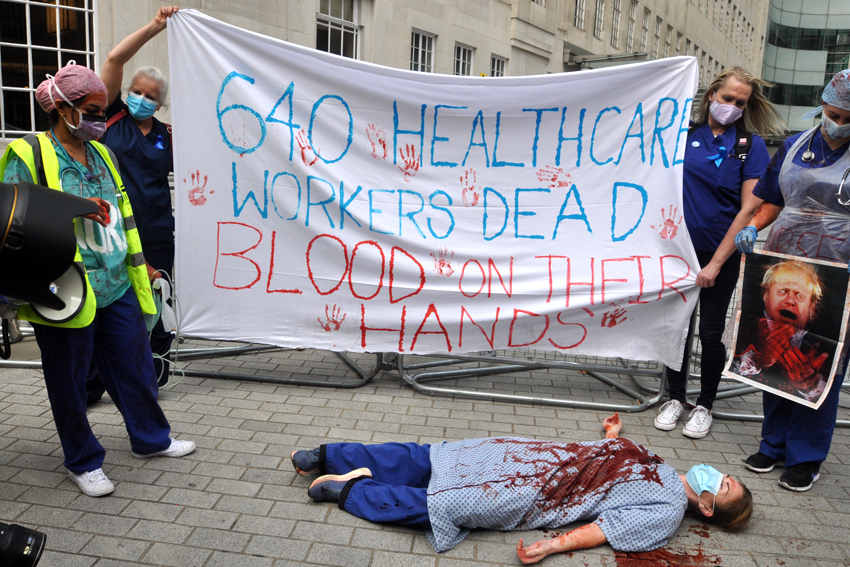
BIOMEDICAL scientists, who have been on the frontline of Covid-19 testing at a Lancashire NHS trust, will stop doing night, weekend and late shifts as part of a month-long strike action over ‘bad faith’ by bosses who reneged on an upgrading pay agreement.
Their union Unite warned that the impact could mean the Accident & Emergency department at the Royal Blackburn Hospital will close at night and weekends.
Unite said that its 21 members working for East Lancashire Hospitals NHS Trust are owed back pay of between several hundred pounds to £8,000, as managers had failed to honour an agreement to upgrade them from band 5 to band 6 on the Agenda for Change (AfC) scale. The back pay issue goes back as far as 2010 for some.
Now the biomedical scientists, who analyse patient blood samples at the Royal Blackburn Hospital and the Burnley General Teaching Hospital will strike continuously from Friday 7th May until Friday 4th June, after they voted by a majority of 85 per cent for strike action.
This will mean that they will only work on their core days – Monday to Friday from 08.45 to 17.00 and early shifts on core days (Monday to Friday) from 07.00 to 15.00.
They are also contracted to work night, weekend and late shifts – but they will be striking during those times.
Unite said that it negotiated an agreement at the end of 2019 for the uplift with the trust management in a bid to tackle the retention crisis which has seen underpaid biomedical scientists voting with their feet and moving to other trusts in the north west that pay the correct AfC pay rate.
Unite said that after the upgrade was agreed with the trust it was then put ‘on hold’ as an act of goodwill during the worst of the pandemic – but now the management is refusing to honour the deal and pay the hundreds of pounds difference between bands 5 and 6.
- On International Workers’ Memorial Day, yesterday, the horror of 150,000 coronavirus deaths in the UK has been laid bare, with Unite throwing its weight behind calls for a statutory public inquiry into the government’s handling of the pandemic.
Many public sector workers, like bus drivers and NHS workers caught the virus at work, with serious questions raised about whether they had adequate protection.
Unite leader Len McCluskey said: ‘In the past year, 150,000 people lost their lives, leaving 150,000 families and countless loved ones with huge holes in their lives. For all those who have sacrificed and suffered through this terrible time, we owe it to them to walk this wall.
‘The scale of loss in the UK is so high relative to other countries that the reasons for this have to be looked at by a public inquiry. The people we lost must be remembered and honoured, and the whole country, including the government, has to learn the lessons of this crisis.
‘Dozens of Unite members died from this dreadful sickness and they will be in my thoughts.
‘Unite offers the bereaved families our full support in the continued battle for the full and frank public inquiry the country needs.’
Over 1,000 NHS workers have caught Covid-19 at work and died of the disease.
Meanwhile, shift workers treated in hospital are up to three times more likely to test positive for coronavirus than other hospitalised patients, a study has found.
Shift work was defined in the study as working outside the hours of 9am to 5pm, and it is estimated that around 25% of the UK’s workforce engages in some form of such work.
Using data from UK Biobank, the world’s largest biomedical database, researchers from the Universities of Manchester, Oxford, and the West Indies found that even after taking account of known coronavirus risk factors, such as age, ethnicity and deprivation, shift work increased the likelihood of testing positive for coronavirus in patients treated in hospital. The nature of the shift work or the occupation of those undertaking the shift work did not seem to affect the association.
Over half a million people were enrolled in the UK Biobank, and of these, 6,442 were tested for Covid-19 in hospital, resulting in 498 positive tests between March and August 2020. The shift workers were 2.5 to three times more likely to test positive than non-shift workers.